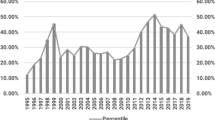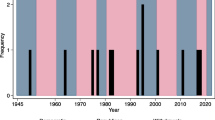Abstract
Electoral theories of democracy imply electoral competition insures accountability. Using data on local elections, socioeconomic factors, and municipal budgets from more than 5,000 municipalities in Brazil for the years 1996, 2000, and 2004, we find that municipalities with more competitive elections allocate less to social spending compared to municipalities with little political competition. We argue that previous theory on political competition and public goods obscures the critical role that financial resources play in shaping the dynamics of social spending and political competition. Municipalities with small budgets lack the resources necessary to engineer convincing electoral victories. Where resources are negligible, voter turnout is low, and incumbents rarely win reelection. Incumbent parties in municipalities with large financial resources win big. Armed with adequate resources, incumbent parties mobilize voters and win by large margins. This new argument and evidence reconcile contradictory findings in the existing literature on competition and public goods.
Similar content being viewed by others
Notes
There is a well-developed literature on the incumbency advantage in the USA, which has demonstrated that US legislative incumbents have a strong advantage in elections over challenge. Reasons for this advantage include the ability to provide favors, gain visibility, and raise money for campaigning (Erikson 1971), redistricting (Cox and Katz 1999), the seniority system, which gives voters an incentive to favor incumbents (McKelvey and Riezman 1992), and the scare-off effect of high-quality candidates choosing not to run against incumbents (Cox and Katz 1996). Cox and Morgenstern argue that the increase in the incumbency advantage is due to larger budgets (1993).
It is important to note that in focusing on social spending, we are intentionally avoiding the contentious battle over whether spending in health, education, and housing represents spending on public or private goods. Empirically, it is quite difficult to distinguish between public expenditures that are targeted narrowly and those that are targeted more broadly (a school, for example, may be a broad public good, but the contract to build the school clearly benefits specific interests). For the sake of simplicity, we assume that most politicians pursue a combination of strategies, including rewarding key supporters, and broader efforts to bolster public opinion (Diaz-Cayeros 2008). Health, education, and housing spending in different contexts can be either narrowly or broadly focused. Our argument does not rely on assumptions about the true nature of public spending. As Kitshelt and Wilkinson convincingly argue, politicians can build support both through patron–client linkages and through programmatic ones. Critically, both strategies require financial resources. Politicians with relatively more to spend simply have more freedom to adopt different strategies than those who are not equally endowed.
The same relationship that holds for social spending also holds for total municipal spending as well (Appendix).
For a discussion of the advantages of subnational quantitative analysis see Snyder (2001).
The estimates reported above are stable: we subjected them to a number of tests to gage their stability. To make sure the results were not driven by swings in annual spending, we calculated the mean levels of spending for 1996–1999 and 2001–2005. We checked to see whether competition in 2000 had any association with the difference between the two averages for those years (see Model 3 in Table 3). We found political competition had a negative association with the difference in spending between the second period 2001–2005 and the first 1996–1999. We also took the mean level of spending between 1996 and 2005 and regressed it on the mean level of competition between three different elections (1996, 2000, and 2004); The mean level of political competition was strongly correlated with the mean level of social spending. Finally, to account for the important differences between Brazilian states--remember the models so far include regional dummy variables--we re-estimated the regression for the 2004 election using state fixed effects. Including state fixed effects had no substantive impact on the results.
As the regressions in Appendix show, the results are not simply capturing the differences between the big metropolitan areas in the country and those of the small rural villages or a relationship that only exists at high levels of political competition. Instead, incumbent parties with big budgets are more likely to win in municipalities above and below the mean of political competition (models 4 and 5). Likewise, financial resources make incumbent party victory more likely in both large and small municipalities alike (models 6 and 7).
References
Alt JE. Some social and political correlates of county borough expenditures. Br J Polit Sci. 1971;1(01):49–62. doi:10.1017/S0007123400008930.
Avelino G, Brown DS, Hunter W. The effects of capital mobility, trade openness, and democracy on social spending in Latin America, 1980–1999. Am J Polit Sci. 2005;49(3):625–41.
Besley T, Burgess R. Political agency, government responsiveness and the role of the media. Eur Econ Rev. 2001;45(4–6):629–40. doi:10.1016/S0014-2921(01)00133-7.
Besley T, Burgess R. The political economy of government responsiveness: theory and evidence from India*. Q J Econ. 2002;117(4):1415–51. doi:10.1162/003355302320935061.
Boyne GA. Party competition and local spending decisions. Br J Polit Sci. 1998;28(1):210–22.
Brollo F, Nannicini T, Perotti R, Tabellini G. Federal Transfers, Corruption, and Political Selection: Evidence from Brazil. Unpublished Manuscript (Bocconi University); 2009.
Brollo F, Nannicini T. Tying your enemy's hands in close races: the politics of federal transfers in Brazil. Institute for the Study of Labor (IZA), IZA Discussion Paper No. 5698; 2011.
Brown DS, Hunter W. Democracy and social spending in Latin America, 1980–92. The Am Polit Sci Rev. 1999;4:779–90. doi:10.2307/2586112.
Brown DS, Hunter W. Democracy and human capital formation: education spending in Latin America, 1980–1997. Comp Polit Stud. 2004;37(7):842–64.
Chhibber P, Nooruddin I. Do party systems count? The number of parties and government performance in the Indian states. Comparative Political Studies. 2004;37(2):152–87. doi:10.1177/0010414003260981.
Cleary MR. Electoral competition, participation, and government responsiveness in Mexico. Am J Polit Sci. 2007;51(2):283–99. doi:10.2307/4620066.
Cox GW, Katz JN. Why did the incumbency advantage in U.S. House elections grow? Am J Polit Sci. 1996;40(2):478–97.
Cox GW, Katz JN. The reapportionment revolution and bias in U.S. Congressional elections. Am J Polit Sci. 1999;43(3):812–41. doi:10.2307/2991836.
Dawson RE, Robinson JA. Inter-party competition, economic variables, and welfare policies in the American states. J Polit. 1963;25(02):265–89. doi:10.2307/2127465.
Diaz-Cayeros A. Electoral risk and redistributive politics in Mexico and the United States. Stud Comp Int Dev. 2008;43(2):129–50.
Erikson RS. The advantage of incumbency in congressional elections. Polity. 1971;3(3):395–405. doi:10.2307/3234117.
Fox J. The difficult transition from clientelism to citizenship: lessons from Mexico. World Politics. 1994;46(2):151–84.
Hecock DR. Electoral competition, globalization, and subnational education spending in Mexico, 1999–2004. Am J Polit Sci. 2006;50(4):950–61.
Hoggart K. Political party control and the sale of local authority dwellings 1974–1983. Environ Plan C Gov Policy. 1985;3(4):463–74.
Holbrook TM, Van Dunk E. Electoral competition in the American states. Am Polit Sci Rev. 1993;87(4):955–62. doi:10.2307/2938827.
IPEA. (2010). Data website. http://www.ipeadata.gov.br Accessed 15 Jan 2013.
Karran T. ‘Borough politics’ and ‘county government’ administrative styles in the old structure. Policy Polit. 1982;10:317–42. doi:10.1332/030557382782628851.
Keefer P, Khemani T. Public expenditures and the poor. The World Bank Research Observer, vol. 20. No. 1 (Spring); 2005.
Keefer P, Vlaicu R. Democracy, credibility, and clientelism. J Law Econ Organ. 2008;24(2):371–406. doi:10.1093/jleo/ewm054.
Kitschelt H, Wilkinson S. Patrons, clients, and policies. Cambridge University Press, Cambridge. 2007.
Lake D, Baum M. The invisible hand of democracy: political control and the provision of public services. 2001; August 1 http://cps.sagepub.com/cgi/content/abstract/34/6/587. Accessed 20 Oct 2012.
McKelvey RD, Riezman R. Seniority in legislatures. Am Polit Sci Rev. 1992;86(4):951–65. doi:10.2307/1964347.
Nooruddin I, Chhibber P. Unstable politics: fiscal space and electoral volatility in the Indian states. Comp Polit Stud. 2008;41(8):1069–91.
Souza C. Constitutional engineering in Brazil: the politics of federalism and decentralization. Macmillan, New York. 1997.
Souza C. Brazil's system of local government, local finance and intergovernmental relations. Paper is part of the EngKaR Research Project 8070: Building Municipal Capacity for Finance and Budgeting. It has been commissioned by the International Development Department of the School of Public Policy, University of Birmingham (UK); 2002.
Stasavage D. Democracy and education spending in Africa. Am J Polit Sci. 2005;49(2):343–58.
Stonecash JM. Inter–party competition, political dialogue, and public policy: a critical review. Pol Stud J. 1987;16(2):243–62. doi:10.1111/j.1541-0072.1987.tb00778.x.
Author information
Authors and Affiliations
Corresponding author
Appendix
Appendix
Rights and permissions
About this article
Cite this article
Boulding, C., Brown, D.S. Political Competition and Local Social Spending: Evidence from Brazil. St Comp Int Dev 49, 197–216 (2014). https://doi.org/10.1007/s12116-013-9145-8
Published:
Issue Date:
DOI: https://doi.org/10.1007/s12116-013-9145-8




